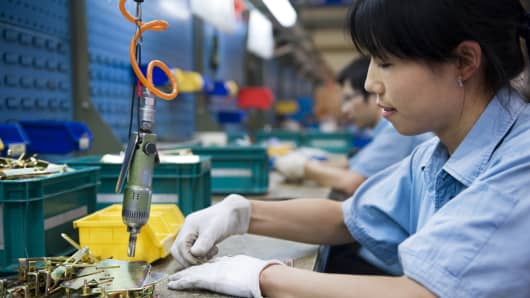Growth in China's vast manufacturing sector picked up in March, a preliminary survey of factory managers showed on Thursday, recovering from a holiday-driven dip the month before but still short of January's strong performance.
The HSBC Purchasing Managers' Index for March revived to 51.7 in March from 50.4 in February, but remained below a two-year high of 52.3 reached at the beginning of the year.
The pullback in February had underpinned expectations growth momentum in the economy was fading and would be muted throughout 2013. Indeed, official data released earlier in March suggested the economy had started 2013 with tepid growth.
The March reading "implies that the Chinese economy is still on track for gradual growth recovery. Inflation remains well behaved, leaving room for Beijing to keep policy relatively accommodative in a bid to sustain growth recovery," wrote HSBC's China economist Qu Hongbin.
The perk-up in March comes after the Lunar New Year holiday that closed most of China's factories for at least two weeks in February. A sub-index measuring factory output rose in March to 52.8, recovering from a dip February, HSBC said.
A result above 50 means the pace of growth is accelerating.
Other sub-indexes pointed to an economy humming along but unlikely to deliver the blistering pace of growth seen in previous years.
Sub-indexes measuring both input and output prices fell, indicating overcapacity upstream and soft demand. That's in line with over a year of falling producer prices, although official data has shown some signs that the decline is bottoming out. An employment sub-index also softened.
On the other hand, sub-indexes tracking new orders and new export orders both showed the pace of growth accelerating, indicating that manufacturing output should be supported in the near future.
Slower Growth
As China's economy matures, the pace of growth is expected to slow to a more sustainable footing -- an expectation reflected in the nation's 7.5 percent GDP growth target for 2013 released at the annual legislative session this month.
A new administration appears to have taken to heart critics' warnings that even that growth rate could be threatened without further reforms, including liberalizing interest rates, making the yuan more tradable and curbing the privileges of the state-owned enterprises.
A reshuffle of officials in charge of financial policy includes a strong roster of policymakers who spearheaded the SOE and bad-debt restructurings of the 1990s.
In the short term, the economy would likely respond more if there was any relaxation of restrictions on the property sector, which supports over 40 industries. A third of Chinese expect home prices will rise in the second quarter, although the central government has said it will not ease curbs and indeed has rolled out new ones.


